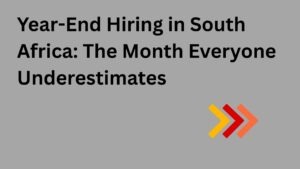
Every December, something strange happens.
Half the country switches off. The other half quietly gets ahead.
And for years, I’ve watched the same pattern play out: The companies who “pause hiring until January” spend the first two months of the new year scrambling. The companies who stay intentional in December start January with signed offers, calmer teams, and early momentum.
Let me tell you a quick story.
The team that didn’t wait
Last year, a client told me in mid-November: “Everyone’s going on leave soon. We’ll wait for January.”
I asked them to humour me. “Let’s run one role. One proper pipeline. See what happens.”
By the second week of December, they had three offers signed. All three hires started in February. All three would’ve been long gone by the time their competitors woke up around 15 January.
That team didn’t work harder. They just didn’t slow down.
And that’s the whole advantage.
Why December works (even though it feels counterintuitive)
December changes people.
Candidates finally have breathing room. Deadlines ease. Meetings drop. Bonuses land. Year-end reflection kicks in.
They start asking themselves the big questions:
-
- “Do I want the same year again?”
- “Is this still right for me?”
- “What could a new chapter look like?”
And because most companies freeze hiring, the noise disappears. There’s no race. No frenzy. Just space — and space is where great hiring happens.
What smart teams do differently
They don’t run massive sprints. They run one simple play:
They hire in December for the roles they’ll desperately need in February.
Not everything. Just the critical roles.
They run clean, quick interviews. They communicate clearly. They keep candidates warm when everyone else goes quiet.
It’s not speed. It’s clarity.
Three reasons December hiring works so well
1. You get candidates’ full attention. No overlapping meetings. No rushing. Better conversations.
2. There’s less competition. You’re not fighting 12 other employers at the same time.
3. Offers stick. Someone who resigns in December is ready for late January or February — exactly when the workload kicks back in.
It’s timing, not luck.
The only real challenge
And honestly, it’s not a December problem — it’s a process problem:
-
- No interview availability
- Slow decisions
- Candidates feeling abandoned during shutdown
This is where hiring collapses.
A recruiter keeps everything moving while your team rotates leave. That alone can make or break a December hire.
So what should you actually do?
Forget the giant checklists. Here’s the version hiring managers remember:
If you want a February or March start, you need December activity. Not chaos – just activity.
One clear briefing. A shortlist. Two interviews. An offer. Weekly touchpoints.
Five moves. That’s the whole play.
Quick FAQ (Because December Always Raises Questions)
“Will candidates even interview during holidays?” Yes. When people are on leave, they’re calmer, available, and more open to honest conversations. Morning virtual interviews work best.
“What if they only want to start after the break?” Perfect. December offer → January resignation → February start. Exactly when teams feel the pressure again.
“What about bonuses?” Most are paid early to mid-December. Make offers after payouts to avoid counter-offer chaos.
“Won’t we struggle to coordinate interviews?” Only if you rely on internal schedules. A recruiter keeps momentum while your team rotates leave.
“Our budget is frozen – should we wait?” Waiting costs more. Every empty seat slows delivery and creates bottlenecks. A February hire could save your entire Q1.
“What if someone ghosts in January?” They ghost when there’s silence. Weekly check-ins, clear timelines, and real engagement fix this.
A final question for you
Most companies ask: “Can we afford to hire in December?”
But the better question is: Can you afford to hit mid-February still trying to replace the person who resigned in November?
That’s the cost nobody calculates – and it’s the one that stings the most.
Community question: Have you ever hired in December and been relieved you didn’t wait? What made it work?
If you already know which role will keep you up at night in February, email me at therese@datatechrecruit.co.za. Let’s get ahead of it now – not when the pressure hits.
Therese Otten is the founder of DataTech Recruitment since 2019 and a Senior IT Recruitment Consultant based in South Africa with 20+ years of Recruitment experience. She specialises in connecting top tech talent with SMEs and start-ups, with a focus on developers, architects, testers, IT leaders and many more. Known for her honest, consultative approach, she is passionate about candidate care, client partnerships, and raising the standard of recruitment in the South African market.
You can follow this newsletter on LinkedIn here
